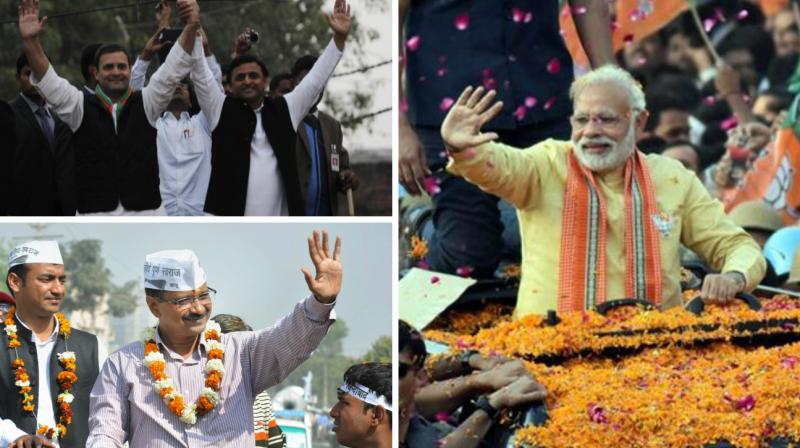Rethink time for parties

New Delhi: Astounding results in favour of the BJP in Uttar Pradesh Assembly elections have once again triggered a debate in political circles on the necessity of a Grand Alliance. All-against-one seems to be the only sound strategy for survival given the unprecedented and unrelenting Modi wave.
The arithmetic of electoral results in UP, Bihar and Delhi Assembly elections clearly demonstrate two things: One, that a split in votes helps the BJP romp home with a majority; and two, the situation changes considerably in a direct contest between the saffron party and a combined Opposition.
Opposition parties pooling their resources and coming together for the 2019 Lok Sabha polls by ensuring there’s no division of votes is then the only way forward.
Hit hard by results of UP Assembly elections, the Congress-led Opposition will be forced to rework its strategy and think in terms of putting together a broader alliance for the next parliamentary elections to stop the surge of the BJP which has gained in key elections due to division of votes.
Results of UP Assembly elections, for instance, clearly prove that a division of votes among Samajwadi Party and the Bahujan Samaj Party helped the BJP in getting a thumping majority.
It was not just the Muslim votes but OBCs and Dalits, the core votebase of the SP and the BSP, that got divided three ways, with a sizeable share going to the BJP as well.
Thus, a three-cornered contest, where division of few votes can change the outcome of elections, worked to the BJP’s advantage. In western UP the situation was worse as Ajit Singh’s Rashtriya Lok Dal was also in the fray, splitting the Jat votes four ways.
Now, consider the situation in the neighbouring state of Bihar where a Grand Alliance between the Congress, the RJD and JD(U) ensured that the BJP was defeated in Assembly elections in 2015 as in most seats there was a direct, two-way fight which averted a split in votes.
But in 2014, Lok Sabha elections, the BJP and its allies managed to win more than 30 of the 40 seats in Bihar as the Grand Alliance allies had contested separately.
“Bihar is a classic example as to how the Grand Alliance learnt from its mistake in the 2014 Lok Sabha elections and, by coming together in Assembly elections, managed to defeat the BJP. Had there been a tie-up in UP between the BSP, SP and the Congress on the lines of Bihar, the situation would have been very different,” a senior Congress leader admitted.
Similarly, in Delhi Assembly elections in 2015, the BJP could manage to win only three of the 70 Assembly seats as it was in a direct fight with the AAP. The Congress was not a force to reckon with and there were rumours that on some seats the Congress transferred its votes to the AAP.
Delhi, like Bihar, proved that when the BJP is pitted in a direct contest with a political opponent, the going gets tough for the saffron party.
Thus, hit hard by the results of UP Assembly elections, there is bound to be a rethink among Opposition parties on whether they need to come together for a broader alliance to stop the Modi juggernaut.

